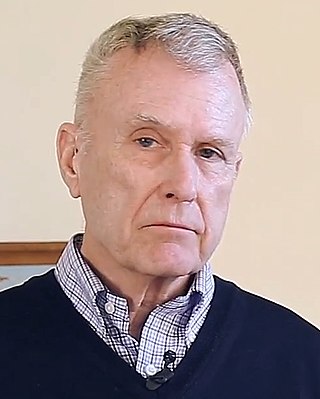Related Research Articles

Arthur Robert Jensen was an American psychologist and writer. He was a professor of educational psychology at the University of California, Berkeley. Jensen was known for his work in psychometrics and differential psychology, the study of how and why individuals differ behaviorally from one another.
Nature versus nurture is a long-standing debate in biology and society about the balance between two competing factors which determine fate: genetics (nature) and environment (nurture). The alliterative expression "nature and nurture" in English has been in use since at least the Elizabethan period and goes back to medieval French.

The George Washington University is a private federally chartered research university in Washington, D.C. Chartered in 1821 by the United States Congress, GW is the largest institution of higher education and the only member of the Association of American Universities in Washington, D.C.

David Cyril Geary is an American cognitive developmental and evolutionary psychologist with interests in mathematical learning and sex differences. He is currently a Curators’ Professor and Thomas Jefferson Fellow in the Department of Psychological Sciences and Interdisciplinary Neuroscience Program at the University of Missouri in Columbia, Missouri.

The George Washington University Law School is the law school of George Washington University, in Washington, D.C. Established in 1865, GW Law is the oldest law school in the national capital. GW Law offers the largest range of courses in the US, with 275 elective courses in business and finance law, environmental law, government procurement law, intellectual property law, international comparative law, litigation and dispute resolution, and national security and U.S. foreign relations law. Admissions are highly selective as the law school receives thousands of applications. In 2020, the acceptance rate was 21%.

Richard Eugene Nisbett is an American social psychologist and writer. He is the Theodore M. Newcomb Distinguished Professor of social psychology and co-director of the Culture and Cognition program at the University of Michigan at Ann Arbor. Nisbett's research interests are in social cognition, culture, social class, and aging. He received his Ph.D. from Columbia University, where his advisor was Stanley Schachter, whose other students at that time included Lee Ross and Judith Rodin.
Research on the heritability of IQ inquires into the degree of variation in IQ within a population that is due to genetic variation between individuals in that population. There has been significant controversy in the academic community about the heritability of IQ since research on the issue began in the late nineteenth century. Intelligence in the normal range is a polygenic trait, meaning that it is influenced by more than one gene, and in the case of intelligence at least 500 genes. Further, explaining the similarity in IQ of closely related persons requires careful study because environmental factors may be correlated with genetic factors.

"Mainstream Science on Intelligence" was a public statement issued by a group of researchers of topics associated with intelligence testing. It was published originally in The Wall Street Journal on December 13, 1994, as a response to criticism of the book The Bell Curve by Richard Herrnstein and Charles Murray, which appeared earlier the same year. The statement defended Herrnstein and Murray's controversial claims about race and intelligence.

Robert Joseph Plomin is an American/British psychologist and geneticist best known for his work in twin studies and behavior genetics. A Review of General Psychology survey, published in 2002, ranked Plomin as the 71st most cited psychologist of the 20th century. He is the author of several books on genetics and psychology.

The George Washington University School of Business is the professional business school of George Washington University in Washington, D.C. The GW School of Business is ranked as one of the top business schools in the United States, with globally ranked undergraduate and graduate programs. GW's campus is also adjacent to some of the world's leading financial institutions, including the Federal Reserve, World Bank, and International Monetary Fund.
In multivariate quantitative genetics, a genetic correlation is the proportion of variance that two traits share due to genetic causes, the correlation between the genetic influences on a trait and the genetic influences on a different trait estimating the degree of pleiotropy or causal overlap. A genetic correlation of 0 implies that the genetic effects on one trait are independent of the other, while a correlation of 1 implies that all of the genetic influences on the two traits are identical. The bivariate genetic correlation can be generalized to inferring genetic latent variable factors across > 2 traits using factor analysis. Genetic correlation models were introduced into behavioral genetics in the 1970s–1980s.

John C. DeFries is one of the world's leading behavior geneticists. His achievements include being President of the Behavior Genetics Association (1982–1983) and cofounder of the journal Behavior Genetics, as well as its co-editor (1970–1978). His awards include The Dobzhansky Award for Outstanding Research in Behavior Genetics, Consulting Editor of the Journal of Learning Disabilities (1987–2002), Fellowships in the International Academy for Research in Learning Disabilities, Association for Psychological Science, and the American Association for the Advancement of Science, Section J (Psychology).

Francesca Gabrielle Elizabeth Happé is Professor of Cognitive Neuroscience and Director of the MRC Social, Genetic and Developmental Psychiatry Centre at the Institute of Psychiatry, Psychology and Neuroscience, King's College London. Her research concerns autism spectrum conditions, specifically the understanding social cognitive processes in these conditions.

Essi Maria Viding FBA FMedSci is Professor of Developmental Psychopathology at University College London in the Faculty of Brain Sciences, where she co-directs the Developmental Risk and Resilience Unit, and an associate of King's College London's Institute of Psychiatry, Psychology and Neuroscience. Viding's research focuses on development of disruptive behaviour disorders, as well as children and young people's mental health problems more broadly. She uses cognitive experimental measures, brain imaging and genetically informative study designs in her work.
Jenae M. Neiderhiser is an American behavior geneticist who is a Distinguished Professor of Psychology and Human Development and Family Studies at Pennsylvania State University, where she is also co-director of the Gene Environment Research Initiative.
Randall Wayne Engle is an American psychologist and professor of psychology at the Georgia Institute of Technology. Dr. Engle is known for his research on working memory, attentional control, and human intelligence. Specifically, his research investigates the nature of working memory, the causes of its limitations, its role in applied cognitive tasks, and the relationships between working memory, cognitive control, and fluid intelligence. His work has received funding from the National Institute of Child Health and Human Development, Air Force Office of Scientific Research, DARPA, and Office of Naval Research. Dr. Engle's work has influenced modern theories of cognitive and emotional control, and has had an impact on a number of fields including social psychology, emotion, psychopathology, developmental psychology, and psychological testing. According to Google Scholar, his work has been cited over 48,000 times. Dr. Engle is the principal investigator in the Attention & Working Memory Lab at the Georgia Institute of Technology.
Denise A. Hines is an American psychologist doing research on domestic violence and sexual abuse with focuses on prevention, intervention, and public policy. She is an associate professor in the Department of Psychology at Clark University in Worcester, Massachusetts.

Leslie D. Leve is an American academic and researcher. She is a professor in the Counseling Psychology and Human Services Department as well as the associate director of Prevention Science Institute at the University of Oregon. She also holds the positions of Associate Director for the Prevention Science graduate programs, was President of the Society for Prevention Research from 2017 to 2019, and is Associate Vice President for Research in the Office of the Vice President for Research and Innovation and serves on National Institutes of Health study section panels and on the editorial board for Development and Psychopathology.
Willem Frederik (Fred) van Raaij is a Dutch psychologist and professor.

Peter Jason Rentfrow is professor of personality and individual differences in the Psychology Department at Cambridge University, where he directs the Social Dynamics Research Center. He is an elected Fellow of the Association for Psychological Science, the Society for Personality and Social Psychology, and the Alan Turing Institute.
References
- ↑ "George W. Howe". George Washington University. Archived from the original on October 5, 2013. Retrieved October 2, 2013.
- 1 2 3 Google Scholar listing